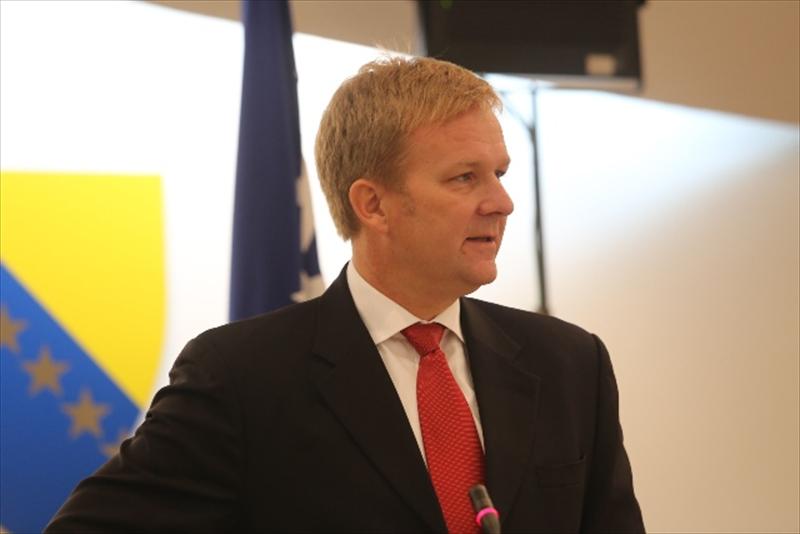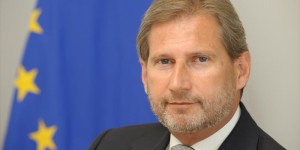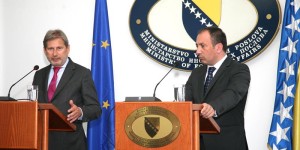Speech by Ambassador Peter Sorensen, Head of the EU Delegation to BiH/EUSR at the BiH Institutional Anti-Corruption Network Conference and the closing event of the EU funded project “Strengthening capacities of BiH institutions to combat and prevent corruption”
23 September 2013, BiH Parliamentary Assembly
Distinguished guests, parliamentarians, colleagues and friends,
It is a pleasure to be here with you today to mark the closure of the EU funded project “Strengthening the capacities of BiH institutions to combat and prevent corruption”.
Eighteen months ago we gathered here, starting this project and declaring our intentions for the future. At that time the Anti-corruption Agency existed only on paper; there were no anti-corruption coordination bodies and only a few strategic policy documents at Entity and none at Cantonal level; there was no coordination mechanism for implementing the Anti-corruption strategy.
This has changed. The Agency for Prevention of Corruption and Coordination of the Fight against Corruption is here. It appointed its core staff, it has its offices and it has started working on its mandate. At Entities level, special bodies are being designated to coordinate the anti-corruption activities and anti-corruption policies have been developed. It is good to see that our EU support played a role in the improvements that happened in the last year.
This fight matters. And we cannot rest only on the laurels of having put in place institutions and mechanisms.
We are not at the end – not even at the end of the beginning in this endeavour.
We need to see a concrete improvement as measured against the demands of EU accession: curbing corruption has been one of the key elements of the accession negotiations in the last EU enlargement rounds and its importance only grows. It is one of the most important requirements for all new member states; and for Bosnia and Herzegovina it is a part of the visa liberalisation roadmap.
Fighting corruption is not a bureaucratic requirement invented in Brussels. It is the citizens of Bosnia and Herzegovina who want and have the right to a functioning, reliable and efficient public service. They want to see an end to systemic corruption that is negatively impacting on their trust in the institutions, the delivery of public services and on the economy at large. To this end, the municipalities, ministries, agencies and their leaderships need to be more effective, open, transparent and accountable.
Over the past year we have seen some progress. Yet it is too slow in light of the extent of the challenge in Bosnia and Herzegovina. The adoption of the law on the Agency was one of the most difficult tasks to accomplish in the framework of the visa liberalisation. It took 4 years to set up the Agency and recruit the staff. This shows that anti-corruption for a long time was not a political priority. This has to change; I see some indications that this change has started: we hear of more commitment from the politicians, we see an increasingly active civil society; we have an Anti-Corruption Agency in place.
The EU and BiH citizens are keen to see a lot more. We are extensively engaged in encouraging and supporting anti-corruption efforts, through the political dialogue we have with Bosnia and Herzegovina to the technical assistance we provide to the Agency. In a comprehensive manner we have provided support from drafting the law on the Anti Corruption Agency to drafting the anti-corruption strategy and action plan. We have provided help ranging from supporting civil society organisations active in the fight against corruption with 3 Million Euros worth of past and future projects, to providing expertise for law enforcement agencies (more than 7 Million) and the anticorruption Agency itself (more than 1 Million).
Next, we need to see:
A continued and further political and financial support to the actors fighting corruption, be it the Agency, the Anticorruption Network that we will discuss today or the law enforcement and the judiciary. For example it is encouraging to see the House of Peoples request from the Council of Ministers to have additional staff and financial resources for the Agency and to provide appropriate funds for the implementation of the anticorruption strategy. I believe that the reaction of the Council of Ministers on the recent Parliamentary request will be an important test of the political will to fight corruption in BiH.
Second, we need a coordinated effort to update the current Anti-corruption strategy expiring in 2014. A thorough review of the strategy implementation has to be done in order to see what worked and what did not work; and why. And an inclusive Working group needs to be formed by the Council of Ministers to start relevant consultations as soon as possible.
We believe that now is also the moment to finalize the adoption of a new public procurement law, the witness protection law and to push further with the protection of whistleblowers.
Beyond that, we want to see the strengthened institutional and policy framework translate into concrete results: a reality in which there are transparent recruitments in the public sector, effective delivery of health services, the procurement of public works which ensures the best use of taxpayers money.
To conclude, now is the right moment to push forward and to demand that your politicians, who will run for the upcoming elections, take a firm stand on the fight against corruption and translate words into action.
It is the right moment to start implementing anticorruption measures in a coherent and effective manner.
The EU is ready to further assist Bosnia and Herzegovina in this process – by supporting, but not by substituting the institutions of Bosnia and Herzegovina in their responsibility before the citizens of the country.
Thank you.




